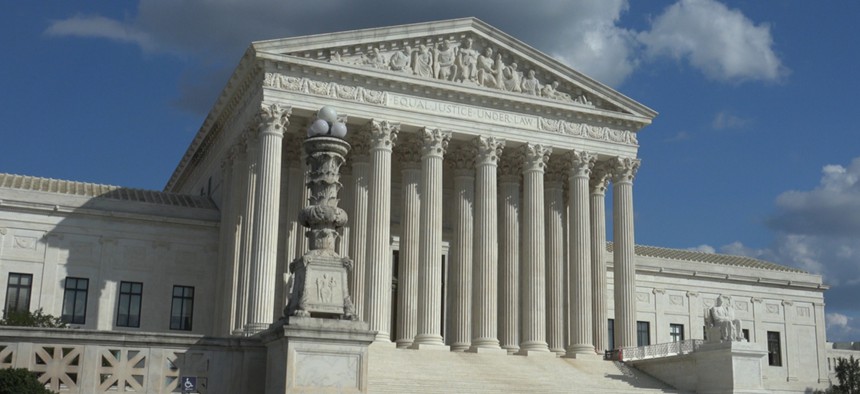States Hope Supreme Court Sports Betting Case Will Lead to Revenue Windfall

The U.S. Supreme Court Shutterstock
The high court might end a “failed statutory regime” that Nevada currently enjoys.
The U.S. Supreme Court will hear a case on sports betting early next month that may effectively legalize the practice in states around the country, ending the monopoly on betting enjoyed for decades by Nevada, moving as much as $400 billion in gambling off the black market, and bringing a revenue windfall to state and local government coffers.
The high court’s review of New Jersey’s appeal in Christie v. National Collegiate Athletic Association is a major state and local government story that has been bubbling on back burners for months. The news moved onto front burners briefly this summer when the court announced it would review the case. Now that the time for the hearing is approaching, major outlets coast to coast are running with their own variations. How might the case upend the big money status quo in Nevada? What could it mean for sports gambling online? Who will be the winners and losers?
Whichever way the ruling goes in the case, it will add a new chapter to the story of how the federalist system—the balance of power between Congress and state legislatures as outlined in the Constitution’s Tenth Amendment—is being applied across the country.
The case specifically concerns the extent to which Congress can “commandeer the legislative processes of the States by directly compelling them to enact and enforce a federal regulatory program,” in the words of the legal filings at the heart of the case. It’s clear that precedent the court will set in its ruling on the matter will apply broadly in many other high-profile and fraught public policy areas, including health care, gun control, immigration and climate change.
For decades, the nation’s top sports leagues, including the NCAA named in the case, officially have opposed any change to the federal law that bans sports betting outside Nevada—the Professional and Amateur Sports Protection Act or PASPA. They have argued that the law is essential to prevent corruption, including game fixing. Previous challenges to the law have all failed to gain traction.
Still, the news that the high court’s justices agreed even to hear the case this year has been taken as a signal that momentum is shifting on the topic.
“It’s a very good sign,” New Jersey Gov. Chris Christie said in June. “We’re not declaring victory, but at least we’re in the game, and that’s where we want to be.”
“Who are we protecting?” asked Ted Leonsis, owner of the Washington Capitals and Washington Wizards. He was speaking, according to The Washington Post, at a recent Capitol Hill conference sponsored by Sportradar, a major sports consultancy. “What are we afraid of in moving to a regulated, transparent system?”
Lawyers arguing against PASPA have long asked the same question.
“When presented with a safe, legal market or an illicit alternative, consumers will almost always choose the former,” wrote lawyers for the American Gaming Association in a brief filed to the Supreme Court last year.
“[E]xperience in Nevada and other nations shows that regulated sports-betting markets all-but eliminate illegal sports gambling,” they wrote. “[T]ransitioning to regulated markets enables states to protect citizens who wager on sports, using consumer protection laws and other measures designed to prevent exploitation and abuse. [And] law enforcement can use the data and revenue generated by regulated sports betting to prevent and investigate corruption [such as matchfixing].”
Observers on all sides mostly agree that the enormous black market in sports betting goes a long way to undercutting the case for the law, at least as it stands. They also agree that the current system amounts to vast sums in lost state and local tax revenue.
Libertarian lawyer Jonathan Wood, in post published in August at the influential SCOTUSblog, described current law governing sports betting as a “failed statutory regime.”
Wood agreed with others who are saying that Supreme Court rulings of the past suggest the court will decide with New Jersey in the case.
Wood’s post is part of a symposium on the case hosted by SCOTUSblog that includes court filings as well as reporting, analysis and opinion pieces.
John Tomasic is a journalist based in Seattle.
NEXT STORY: GOP Tax Overhaul Could Hit State and Local Pension Plans With Federal Tax





